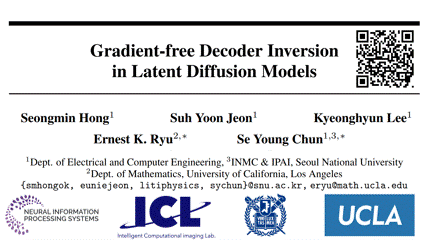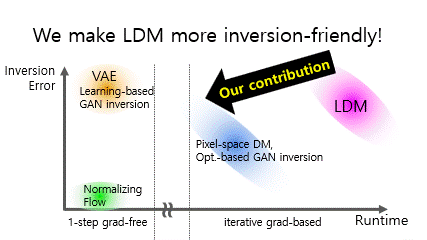Gradient-free Decoder Inversion in Latent Diffusion Models
Seongmin Hong1, Suh Yoon Jeon1, Kyeonghyun Lee1, Ernest K. Ryu2, Se Young Chun1,3
2Dept. of Mathematics, University of California, Los Angeles
NeurIPS 2024
[Paper] [arXiv] [video] [github] [bibTeX]
Main Idea (gif)

Main Contribution

Convergence Analysis



Results

Our gradient-free decoder inversion is:
-
Fast: up to 5× faster, 1.89 s vs 9.51 s to achieve -16.4 dB (InstaFlow)
-
Accurate: up to 2.3 dB lower, -21.37 dB vs -19.06 dB in 25.1 s (LaVie)
-
Memory-efficient: up to 89% can be saved, 7.13 GB vs 64.7 GB (Lavie)
-
Precision-flexible: 16-bit vs 32-bit (all)
Poster

Abstract
In latent diffusion models (LDMs), denoising diffusion process efficiently takes place on latent space whose dimension is lower than that of pixel space. Decoder is typically used to transform the representation in latent space to that in pixel space. While a decoder is assumed to have an encoder as an accurate inverse, exact encoder-decoder pair rarely exists in practice even though applications often require precise inversion of decoder. Prior works for decoder inversion in LDMs employed gradient descent inspired by inversions of generative adversarial networks. However, gradient-based methods require larger GPU memory and longer computation time for larger latent space. For example, recent video LDMs can generate more than 16 frames, but GPUs with 24 GB memory can only perform gradient-based decoder inversion for 4 frames. Here, we propose an efficient gradient-free decoder inversion for LDMs, which can be applied to diverse latent models. Theoretical convergence property of our proposed inversion has been investigated not only for the forward step method, but also for the inertial Krasnoselskii-Mann (KM) iterations under mild assumption on cocoercivity that is satisfied by recent LDMs. Our proposed gradient-free method with Adam optimizer and learning rate scheduling significantly reduced computation time and memory usage over prior gradient-based methods and enabled efficient computation in applications such as noise-space watermarking while achieving comparable error levels.
BibTeX
@inproceedings{hong2024gradient,
author = {Hong, Seongmin and Jeon, Suh Yoon and Lee, Kyeonghyun and Ryu, Ernest K. and Chun, Young},
booktitle = {Advances in Neural Information Processing Systems},
editor = {A. Globerson and L. Mackey and D. Belgrave and A. Fan and U. Paquet and J. Tomczak and C. Zhang},
pages = {82982--83007},
publisher = {Curran Associates, Inc.},
title = {Gradient-free Decoder Inversion in Latent Diffusion Models},
url = {https://proceedings.neurips.cc/paper_files/paper/2024/file/970f59b22f4c72aec75174aae63c7459-Paper-Conference.pdf},
volume = {37},
year = {2024}
}